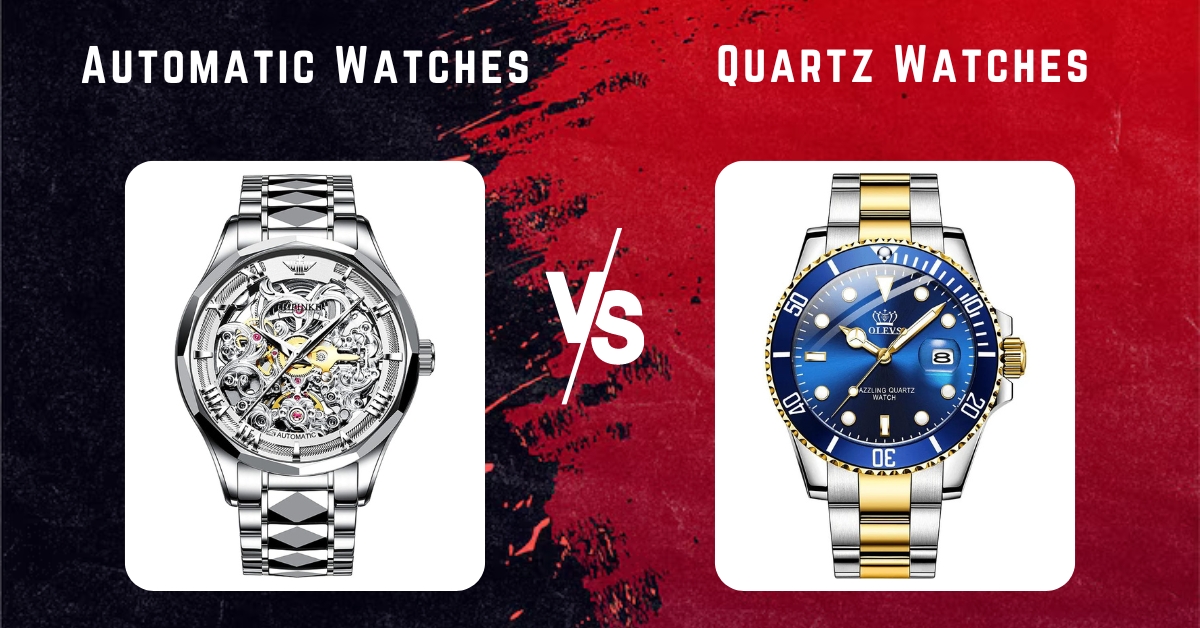Automatic watches are self-winding mechanical timepieces powered by your movement. Quartz watches are battery-powered electronic timepieces known for their exceptional accuracy.
Introduction
The world of watches beckons with captivating choices, each timepiece whispering a promise of precision and style. But navigating this realm can be daunting, especially when faced with the seemingly endless debate: automatic vs. quartz watches.
Automatic watches, marvels of mechanical ingenuity, harness your daily movements to power themselves, while quartz watches, bastions of convenience, rely on a tiny battery for unwavering accuracy.
This comprehensive guide delves into the fascinating history, intricate mechanisms, design aesthetics, and user experiences of both automatic and quartz watches. By the end of this journey, you’ll be empowered to make an informed decision and select the timepiece that perfectly complements your personality and lifestyle.
History of Each Watch
Automatic Watches: Their ingenious mechanism boasts a rich history. The concept of a self-winding watch can be traced back to the late 18th century, with Abraham-Louis Perrelet credited with crafting the first successful automatic timepiece in 1770.
However, these early designs were complex and unreliable. It wasn’t until the 20th century that advancements in materials and engineering led to the development of the automatic watches we know and appreciate today.
Brands like Rolex and Omega played a pivotal role in popularizing automatics, making them a symbol of luxury and innovation.
Quartz Watches: The invention of the quartz crystal oscillator in the 1920s revolutionized timekeeping. The first commercially available quartz watch, the Seiko Astron, debuted in 1969, forever changing the watch landscape.
Quartz watches offered previously unimaginable accuracy at a fraction of the cost of mechanical watches. This affordability and precision propelled quartz to become the dominant force in the watch market throughout the latter half of the 20th century.
Technical Breakdown
Let’s delve into the nitty-gritty of automatic and quartz watches, exploring the intricate mechanisms that make them tick (or, well, in the quartz watch’s case, vibrate!).
Movement
Automatic Watches: Possess a complex automatic movement powered by a rotor, a semi-circular weight that rotates with your arm movements. The rotor winds the mainspring, storing energy that powers the watch’s gears and keeps it running.
This eliminates the need for battery changes but requires you to wear the watch regularly to maintain its power reserve.
Quartz Watches: Utilize a battery-powered quartz movement. A tiny quartz crystal vibrates at a precise frequency, generating electrical pulses that regulate the movement of the hands. This electronic design offers exceptional accuracy, making quartz watches renowned for their ability to keep perfect time.
Materials and Construction
Automatic Watches: Often crafted from high-quality materials like stainless steel, sapphire crystal, and ceramic. The intricate automatic movement requires precise engineering and skilled watchmakers to ensure smooth operation and longevity.
Quartz Watches: Can utilize a wider range of materials, including stainless steel, plastic, and even some luxury materials like titanium or ceramic. The simpler quartz movement allows for more affordable production compared to automatics.
Functions and Features
Automatic Watches: Primarily focus on timekeeping, although some may offer additional complications like date displays or moon phases. Their strength lies in the self-winding mechanism, offering convenience and the satisfaction of owning a timepiece powered by your movement.
Quartz Watches: Offer an array of functionalities beyond just timekeeping. Many quartz watches feature additional features like alarms, chronographs, world time displays, and even calculator functions. Their battery-powered nature allows for the integration of various electronic modules, making them incredibly versatile.
Water Resistance
Automatic Watches: Water resistance can vary depending on the specific model. Many offer basic water resistance suitable for everyday wear or handwashing, while some boast impressive depths suitable for swimming or even diving. Always refer to the manufacturer’s specifications for water resistance details.
Quartz Watches: Similar to automatic watches, water resistance varies by model. Basic quartz watches may offer minimal water resistance, while some sports watches are built to withstand significant water pressure, making them ideal for activities like sailing or water sports.
Design and Aesthetics
While both automatic and quartz watches prioritize functionality, their visual appeal plays a significant role in their allure. Let’s explore the design elements that define each category.
Dial Design
Automatic Watches: Typically feature a clean and elegant dial layout, focusing on clear timekeeping displays. Hour markers and hands come in various styles, from classic Roman numerals to luminous markers for nighttime visibility.
Some automatic watches may incorporate additional complications like date windows or moon phases, adding a touch of complexity to the dial.
Quartz Watches: Can offer a wider range of dial designs due to the simpler quartz movement. While some quartz watches maintain a classic aesthetic similar to automatics, others may embrace a more modern or digital look.
The ability to integrate additional functionalities can also lead to busier dials with sub-dials for features like chronographs or world time displays.
Case and Bracelet
Automatic Watches: Available in a wide range of case materials and styles, from classic stainless steel to luxurious precious metals like gold or platinum. Case sizes can vary depending on personal preference, with options ranging from dressy and compact to sporty and bold.
Bracelets come in various materials like stainless steel, leather, or rubber, allowing you to match the watch to your style and occasion.
Quartz Watches: Offer similar case and bracelet options as automatic watches. Stainless steel is a popular choice for its durability, while some quartz watches may utilize lightweight materials like titanium for enhanced comfort. The design of the case and bracelet can vary depending on the intended purpose of the watch.
For example, sports watches might favor a more rugged and functional aesthetic, while dress watches might prioritize a sleek and sophisticated look.
Brand Image
Automatic Watches: Often associated with luxury, heritage, and craftsmanship. Brands like Rolex, Omega, and Patek Philippe have built their reputations on the intricate mechanics and timeless designs of their automatic watches, making them coveted status symbols.
However, many affordable automatic watches from reputable brands like Seiko and Citizen offer excellent value for the price.
Quartz Watches: Possess a more diverse brand image. While some luxury brands offer high-end quartz watches with exceptional features and materials, quartz technology has also democratized watch ownership, making stylish and functional timepieces accessible to a broader audience.
Brands like Casio, Seiko, and Citizen are renowned for their innovative and affordable quartz watches.
User Feedback
Understanding how others experience these watches can be valuable. Here’s a glimpse into user feedback on both automatic and quartz watches:
Automatic Watches: Users appreciate the convenience of the self-winding mechanism and the satisfaction of owning a piece of mechanical engineering. The classic design and perceived prestige of automatic watches are also frequently cited as positive aspects.
However, some users find automatics to be thicker due to the movement and may miss features like multiple time zones or alarms.
Quartz Watches: Users value the exceptional accuracy and affordability of quartz watches. The vast array of styles and functionalities available in quartz watches also resonates with many wearers.
However, some users find quartz watches to lack the same level of craftsmanship and heritage as automatic watches and may perceive them as less personal.
Common Problems
No timepiece is perfect, and both automatic and quartz watches can encounter certain issues. Let’s explore some common problems:
Automatic Watches: These may require periodic maintenance due to the complexity of the automatic movement. If not worn regularly, automatics may stop running and need to be manually wound to get them started again. Additionally, shocks or strong magnetic fields can potentially damage delicate movement.
Quartz Watches: While the battery typically lasts for several years, it will eventually need to be replaced. A dead battery can render the watch inoperable until a new one is installed. Some complex quartz watches with multiple features may require specialized technicians for battery replacement.
Choosing Your Champion
The decision between an automatic and a quartz watch boils down to your needs and preferences. Here’s a quick guide to help you choose your champion:
Choose an Automatic Watch If:
- You prioritize a watch that winds itself and eliminates the need for battery changes.
- You appreciate the craftsmanship and heritage associated with mechanical timepieces.
- You value the satisfaction of owning a watch powered by your movement.
- You are willing to potentially invest more for a premium automatic watch.
- You don’t mind the slightly thicker profile of some automatic watches due to the movement.
Choose a Quartz Watch If:
- You prioritize exceptional accuracy and never want to worry about your watch losing time.
- You value affordability and a wide range of styles and functionalities to choose from.
- You appreciate the convenience of a battery-powered watch that requires minimal maintenance.
- You travel frequently and require features like world time or alarms.
- You lead an active lifestyle and require a durable and water-resistant watch.
- You prefer a thinner profile on your wrist.
Still Undecided? Here’s a Helping Hand
If you’re still struggling to choose between an automatic and a quartz watch, consider these additional factors:
Lifestyle: Do you lead an active lifestyle that demands a durable and water-resistant watch? A quartz watch might be the better choice due to its simpler construction and often higher water resistance ratings. If you prioritize a classic and sophisticated timepiece for everyday wear, an automatic could be ideal.
Activity Level: If your daily activities involve frequent swimming or diving, ensure the watch offers adequate water resistance. Both automatic and quartz watches can have varying water resistance levels, so check the specifications before making a decision.
Personal Style: Ultimately, the watch you choose should complement your personal style. Automatic watches often lean towards elegance, while quartz watches can offer a wider range of aesthetics, from sporty to modern. Consider your wardrobe and the overall look you’re trying to achieve.
Conclusion
The world of watches offers a captivating array of choices. By understanding the intricacies of automatic and quartz watches, you’re well on your way to finding the perfect timepiece that reflects your personality and lifestyle.
Whether you crave the satisfaction of a self-winding masterpiece or the unwavering accuracy of a quartz marvel, both options offer distinct advantages. Embrace the journey of discovery, and soon you’ll be adorning your wrist with a watch that tells not only the time but also a captivating story about you.
FAQs
1. Are automatic watches more durable than quartz watches?
Not necessarily. Both automatic and quartz watches can be very durable depending on the materials and construction. However, the simpler quartz movement may be less susceptible to damage from shocks compared to the more complex automatic movement.
2. Can I wear an automatic watch if I don’t wear it every day?
Yes, but you might need to wind it down manually to get it started again if it stops due to inactivity. Some automatic watches also offer watch winders, which can keep the watch running when not worn.
3. How long do quartz watch batteries last?
The battery life of a quartz watch can vary depending on the type of movement and features used. Typically, a quartz watch battery can last for several years, ranging from 2-5 years on average.
4. Are there any eco-friendly options for watches?
Yes, there are solar-powered quartz watches that use light to charge the battery, reducing the need for frequent battery replacements. Additionally, some watch manufacturers are using recycled materials in their watch cases and bracelets.
5. Is it worth getting a vintage automatic watch?
Vintage automatic watches can be charming and offer a unique piece of history. However, they may require servicing or repairs to ensure proper functionality. Do your research and ensure you’re purchasing from a reputable seller before investing in a vintage timepiece.

